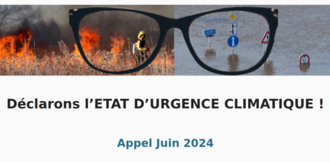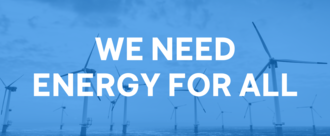-
Déclarons l’ETAT D’URGENCE CLIMATIQUE !L’urgence climatique devient de facto la première urgence pour les migrants, pour les femmes, pour les pauvres, pour les minorités, pour l’égalité, pour la démocratie, etc. La logique intersectionnelle de la notion de transition juste, indispensable, ne peut nier le fait évident qu’il n’y aura plus de justice sur une planète morte. L’urgence climatique doit donc devenir LA priorité absolue de tous les mouvements progressistes, qui doivent se coaliser bien davantage s’ils veulent peser sur la trajectoire historique. La transition juste sauvegarde l’habitabilité de la planète ET déploie la justice sociale EN renforçant la démocratie. Une stratégie de coalition est à formuler. Divisés et éparpillés, sans vision stratégique de transition écologique juste et démocratique, nous laissons de facto régner les écocidaires qui, eux, sont très bien organisés depuis 50 ans. Désormais, liberté et justice riment avec écologie. Nous savons, nous pouvons, nous devons. C’est dans l’intérêt du pays, de toutes et de tous. Nous n’avons plus aucune excuse pour ne pas le faire. FR : https://obsant.eu/deuc2024/ NL : https://obsant.eu/hoog-tijd-om-de-klimaatnoodtoestand-uit-te-roepen/ EN : https://obsant.eu/let-us-declare-a-state-of-climate-emergency/ DE : https://obsant.eu/erklaren-wir-den-klimanotstand/275 of 300 SignaturesCreated by Observatoire de l'Anthropocène
-
Stadtwerke Hanau: Raus aus der Gaslobby, raus aus Zukunft Gas!Wir wollen unser Stadtwerk für seine Verpflichtung zum Gemeinwohl jetzt zur Verantwortung ziehen. Es ist an der Zeit, dass unser Stadtwerk in Hanau aus "Zukunft Gas" aussteigt und stattdessen in eine bessere, gerechtere und saubere Zukunft mit erneuerbarer Energie investiert. Denn die Wissenschaft zeigt deutlich, dass fossiles Gas nicht Teil unserer Zukunft sein kann. Unterstützen wir unser Stadtwerk dabei, sich gegen die manipulative Taktik der Gaslobby zu stellen und eine saubere, gerechte und leistbare Zukunft voranzutreiben. Wir haben die Macht, unsere lokalen öffentlichen Einrichtungen zur Rechenschaft zu ziehen und so einen wichtigen Anstoß für die dringend benötigte Transformation zu geben.71 of 100 SignaturesCreated by Eva-Marie Merget
-
Support the Energy For All Guarantee: Clive LewisNo matter how much money you make or where you are in the UK, everyone deserves to have access to the energy and electricity they need to live dignified lives in safe and comfortable homes. The UK is still overly reliant on expensive, unreliable and harmful oil and gas, causing energy bills to skyrocket and harms our climate. In addition, a huge amount of UK housing is highly energy inefficient and badly insulated. You can read more about Fuel Poverty Action’s Energy For All manifesto here: https://energyforall.org.uk/manifesto.html2 of 100 SignaturesCreated by Sophie Ciurlik Rittenbaum
-
Support the Energy For All Guarantee: Sarah GreenNo matter how much money you make or where you are in the UK, everyone deserves to have access to the energy and electricity they need to live dignified lives in safe and comfortable homes. The UK is still overly reliant on expensive, unreliable and harmful oil and gas, causing energy bills to skyrocket and harms our climate. In addition, a huge amount of UK housing is highly energy inefficient and badly insulated. You can read more about Fuel Poverty Action’s Energy For All manifesto here: https://energyforall.org.uk/manifesto.html1 of 100 SignaturesCreated by Jonathan Bean
-
Support the Energy For All Guarantee: Liz KendallNo matter how much money you make or where you are in the UK, everyone deserves to have access to the energy and electricity they need to live dignified lives in safe and comfortable homes. The UK is still overly reliant on expensive, unreliable and harmful oil and gas, causing energy bills to skyrocket and harms our climate. In addition, a huge amount of UK housing is highly energy inefficient and badly insulated. You can read more about Fuel Poverty Action’s Energy For All manifesto here: https://energyforall.org.uk/manifesto.html14 of 100 SignaturesCreated by Anne Scott
-
Support the Energy For All Guarantee: Tom HuntNo matter how much money you make or where you are in the UK, everyone deserves to have access to the energy and electricity they need to live dignified lives in safe and comfortable homes. The UK is still overly reliant on expensive, unreliable and harmful oil and gas, causing energy bills to skyrocket and harms our climate. In addition, a huge amount of UK housing is highly energy inefficient and badly insulated. You can read more about Fuel Poverty Action’s Energy For All manifesto here: https://energyforall.org.uk/manifesto.html1 of 100 SignaturesCreated by Paul Daley
-
Support the Energy For All Guarantee: Sarah DykeNo matter how much money you make or where you are in the UK, everyone deserves to have access to the energy and electricity they need to live dignified lives in safe and comfortable homes. The UK is still overly reliant on expensive, unreliable and harmful oil and gas, causing energy bills to skyrocket and harms our climate. In addition, a huge amount of UK housing is highly energy inefficient and badly insulated. You can read more about Fuel Poverty Action’s Energy For All manifesto here: https://energyforall.org.uk/manifesto.html1 of 100 SignaturesCreated by Jimi Kelson
-
Support the Energy For All Guarantee: Anne Marie MorrisNo matter how much money you make or where you are in the UK, everyone deserves to have access to the energy and electricity they need to live dignified lives in safe and comfortable homes. The UK is still overly reliant on expensive, unreliable and harmful oil and gas, causing energy bills to skyrocket and harms our climate. In addition, a huge amount of UK housing is highly energy inefficient and badly insulated. You can read more about Fuel Poverty Action’s Energy For All manifesto here: https://energyforall.org.uk/manifesto.html3 of 100 SignaturesCreated by Debs Rylands
-
Support the Energy For All Guarantee: Craig MackinlayNo matter how much money you make or where you are in the UK, everyone deserves to have access to the energy and electricity they need to live dignified lives in safe and comfortable homes. The UK is still overly reliant on expensive, unreliable and harmful oil and gas, causing energy bills to skyrocket and harms our climate. In addition, a huge amount of UK housing is highly energy inefficient and badly insulated. You can read more about Fuel Poverty Action’s Energy For All manifesto here: https://energyforall.org.uk/manifesto.html1 of 100 SignaturesCreated by Richard Langworthy
-
Support the Energy For All Guarantee: Priti PatelNo matter how much money you make or where you are in the UK, everyone deserves to have access to the energy and electricity they need to live dignified lives in safe and comfortable homes. The UK is still overly reliant on expensive, unreliable and harmful oil and gas, causing energy bills to skyrocket and harms our climate. In addition, a huge amount of UK housing is highly energy inefficient and badly insulated. You can read more about Fuel Poverty Action’s Energy For All manifesto here: https://energyforall.org.uk/manifesto.html1 of 100 SignaturesCreated by Robert Taber
-
Support the Energy For All Guarantee: Chi OnwurahNo matter how much money you make or where you are in the UK, everyone deserves to have access to the energy and electricity they need to live dignified lives in safe and comfortable homes. The UK is still overly reliant on expensive, unreliable and harmful oil and gas, causing energy bills to skyrocket and harms our climate. In addition, a huge amount of UK housing is highly energy inefficient and badly insulated. You can read more about Fuel Poverty Action’s Energy For All manifesto here: https://energyforall.org.uk/manifesto.html2 of 100 SignaturesCreated by Michael O’Neil
-
Support the Energy For All Guarantee: Alex SobelNo matter how much money you make or where you are in the UK, everyone deserves to have access to the energy and electricity they need to live dignified lives in safe and comfortable homes. The UK is still overly reliant on expensive, unreliable and harmful oil and gas, causing energy bills to skyrocket and harms our climate. In addition, a huge amount of UK housing is highly energy inefficient and badly insulated. You can read more about Fuel Poverty Action’s Energy For All manifesto here: https://energyforall.org.uk/manifesto.html4 of 100 SignaturesCreated by Jovi Oliver











